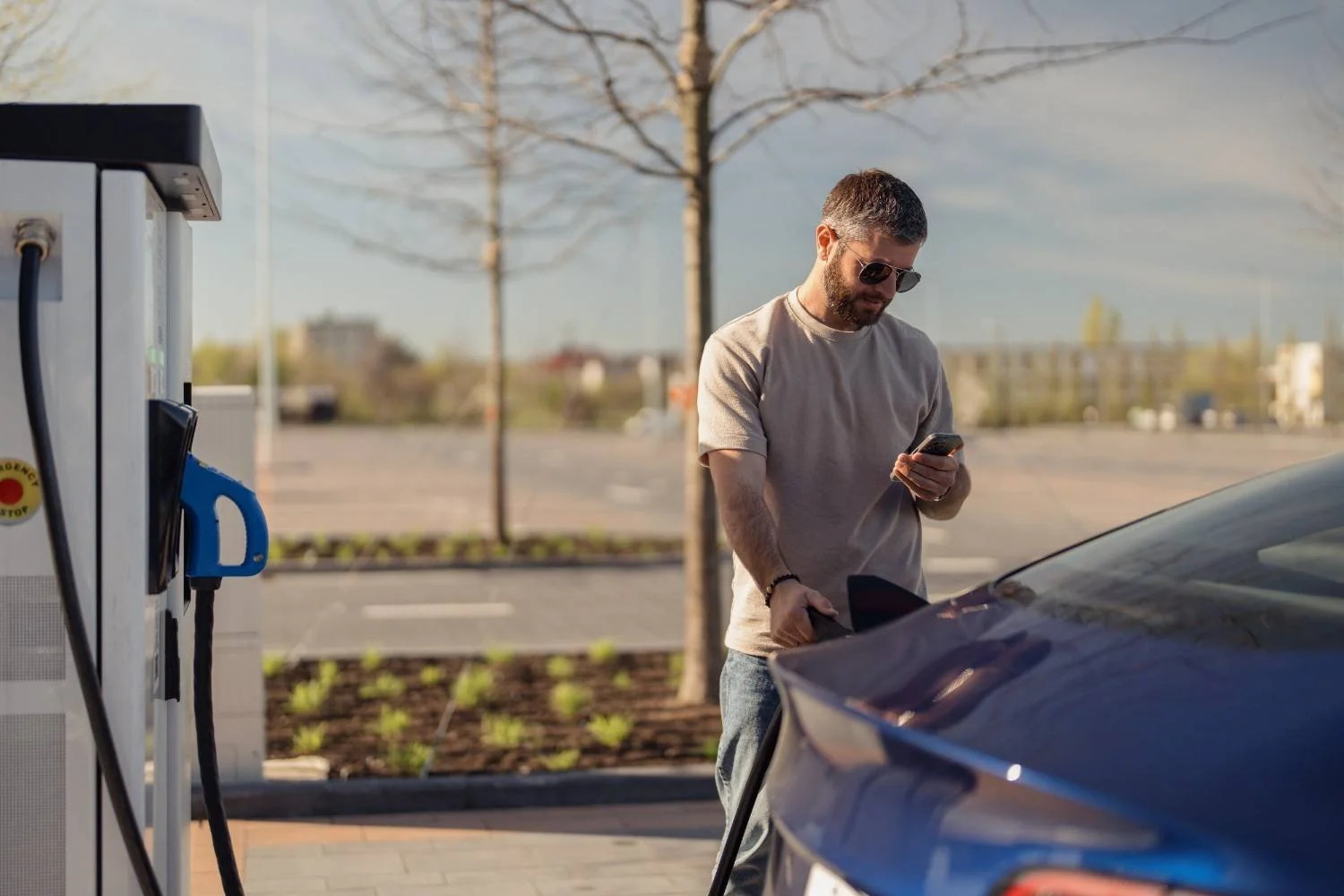EV Charging Salary Sacrifice Explained: The Tax-Efficient Way to Power Your Electric Car
Source: Shutterstock
Switching to an electric car is smart for the environment, but what about your wallet? While EVs promise lower running costs, charging expenses can quickly add up - especially if you rely on public charging networks. That's where EV charging salary sacrifice becomes key for any electric car driver looking to save. The good news? This tax-efficient solution can reduce your EV charging costs by 20-50%. Here's everything you need to know about this game-changing approach to powering your electric vehicle.
What Makes EV Charging Tax Efficient?
Tax-efficient EV charging isn't just about finding cheaper rates - it's about leveraging the UK's salary sacrifice system to reduce your overall tax burden whilst covering essential charging costs.
When you use salary sacrifice for any eligible benefit, including EV charging costs, you're paying for that benefit from your gross salary before income tax and National Insurance contributions are calculated. This creates immediate savings because you're not paying tax on the money used for charging your electric car.
The HMRC guidelines on salary sacrifice confirm that employees can use pre-tax salary to pay for qualifying benefits, including certain travel and vehicle-related expenses, making it a great way to reduce your charging costs.
How Salary Sacrifice Creates Tax Advantages for EV Charging
Understanding the salary sacrifice charging tax benefits helps you see exactly where your savings come from. Here's how it works:
As an employee of a company that offers this benefit, instead of receiving your full gross salary and then paying for EV charging from your take-home pay, salary sacrifice allows you to:
Reduce your gross salary by the amount needed for charging costs
Pay less income tax because your taxable income is lower
Pay less National Insurance for the same reason
Cover your charging expenses without feeling the full financial impact
The beauty of this system is that electric car charging tax savings compound over time. Each month, you're not just saving on charging - you're saving on the taxes you would have paid on that money.
EV Charging Salary Sacrifice: How It Works For Employees
If your company already offers a salary sacrifice charging scheme, like The Charge Scheme, it’s easy to start saving.
Step 1: Employee Setup
You'll receive a dedicated charging app and card that works with over 69,000 public charging points across the UK. This covers all your public charging needs, whilst home and workplace charging costs are calculated separately.
Step 2: Monthly Tracking
Each month, you submit your mileage through an easy-to-use portal. This takes about 10 seconds and helps calculate your actual charging costs based on real usage.
Step 3: Cost Calculation
The system automatically calculates all your charging costs, whether from public charging sessions, home charging based on your tariff, or workplace charging, where applicable.
Step 4: Payroll Integration
Your employer receives clear payroll instructions to deduct the charging costs from your gross salary. This happens seamlessly through your existing payroll system.
This approach to tax-efficient electric car charging means you're always paying the most cost-effective rate possible!
Tax Savings Calculations: Real Examples of EV Charging Cost Reduction
Let's look at some practical examples using The Charge Scheme’s calculator.
The first example compares a basic-rate and a higher-rate taxpayer who both charge their Kia EV3 mostly at home.
| Breakdown | Basic-rate taxpayer | Higher-rate taxpayer |
|---|---|---|
| Public charging | £2,951 | £2,951 |
| Other charging | £2,079 | £2,079 |
| Total charging cost | £5,030 | £5,030 |
| Salary sacrifice | £5,533 | £6,036 |
| Net energy cost | £3,984 | £3,501 |
| Savings | £1,046 | £1,529 |
(These figures are based on 15,000 miles per annum, 3-year lease, the basic-rate taxpayer earning £40,000 per year, and the higher-rate taxpayer earning £70,000 per year)
The next example compares the same individuals (a basic-rate taxpayer and a higher-rate taxpayer), but instead of charging at home, they rely solely on public chargers because they don’t have a driveway.
| Breakdown | Basic-rate taxpayer | Higher-rate taxpayer |
|---|---|---|
| Public charging | £8,679 | £8,679 |
| Other charging | £0 | £0 |
| Total charging cost | £8,679 | £8,679 |
| Salary sacrifice | £9,547 | £10,415 |
| Net energy cost | £6,874 | £6,040 |
| Savings | £1,805 | £2,638 |
For drivers with home charging access, basic-rate taxpayers save over £1,000 annually, whilst higher-rate taxpayers enjoy nearly £1,500 in electric car charging tax savings. However, the power of salary sacrifice charging is for those without access to home charging, where reliance on expensive public networks means basic-rate taxpayers save £1,805 annually and higher-rate taxpayers benefit from an impressive £2,638 reduction!
Salary Sacrifice vs Other Charging Payment Methods
EV charging tax efficiency becomes clear when you compare salary sacrifice with alternative payment methods:
Traditional Payment (Post-Tax Income)
Pay the full retail price for charging
Use money that's already been taxed
No tax benefits
Full cost burden on take-home pay
Company Fuel Cards
Often limited to specific networks
May not cover home charging
Can create benefit-in-kind tax implications
Less flexibility for personal use
Mileage Reimbursement
Usually covers business miles only
Rates may not reflect actual EV efficiency
Requires detailed record-keeping
Often delayed reimbursement
Salary Sacrifice for EV Charging
Covers all types of charging (home, work, public)
Works with any EV and any charging network
Simple monthly process
20-50% cost reduction depending on tax bracket
Benefits for Different Tax Brackets 2025/26
Salary sacrifice charging tax benefits scale with your income, making this approach valuable (no matter which tax bracket you’re in).
Basic Rate Taxpayers (£12,571 - £50,270)
Income tax: 20%
National Insurance: 8% (on earnings between £12,570-£50,270)
Combined tax and NI savings: 28%
Higher Rate Taxpayers (£50,271 - £125,140)
Income tax: 40%
National Insurance: 2% (on earnings above £50,270)
Combined savings: 42%
Additional Rate Taxpayers (over £125,140)
Income tax: 45%
National Insurance: 2%
Combined savings: 47%
The current UK tax rates can be found in the government's rates and allowances guidance, which helps you calculate your potential savings accurately.
Employer Tax Advantages: Why Businesses Love EV Charging Salary Sacrifice
Tax-efficient EV charging benefits everyone - employees save money whilst employers gain significant advantages from implementing The Charge Scheme.
Reduced Employer National Insurance
When employees choose to sacrifice their salary for charging benefits, employers pay less National Insurance on the reduced gross salary.
Zero Cost to The Employer
Employers can offer valuable salary sacrifice EV charging benefits at no setup or running costs. The scheme is designed to be cost-neutral whilst providing a highly valued employee benefit.
Support for Net Zero Goals
By making EV charging more affordable, employers actively encourage electric vehicle adoption, supporting corporate sustainability targets and demonstrating commitment to environmental responsibility.
Simplified Mileage Management
Traditional mileage reimbursement creates an admin burden. EV charging salary sacrifice shows how this approach eliminates complex mileage claims whilst providing accurate, real-time charging cost data.
Attraction and Retention Tool
In competitive job markets, offering tax-efficient electric car charging helps attract environmentally conscious employees and retain existing staff who value progressive benefits.
Who Benefits Most from Salary Sacrifice EV Charging?
Salary sacrifice EV charging benefits are particularly valuable for specific groups of people, such as:
People Without Access To Home Charging
Over 9 million UK households can't install home chargers due to a lack of off-street parking. For these drivers, public charging is essential but expensive. EV charging cost reduction through salary sacrifice makes electric cars financially viable for renters and flat owners.
High-Mileage Drivers
Business users and frequent travellers who rely heavily on public charging networks see the biggest savings from tax-efficient EV charging. Annual savings can exceed £2,000 for high-mileage users.
Company Car Drivers
Many company car schemes now focus on electric vehicles. Adding electric car charging tax savings removes a major barrier to EV adoption and makes company electric cars genuinely cheaper to run than petrol or diesel alternatives.
Multiple EV Households
Families with more than one electric vehicle can apply salary sacrifice charging to all their EVs, multiplying the tax benefits across their entire household charging needs.
Getting Started with Tax-Efficient EV Charging
Ready to start benefiting from EV charging salary sacrifice? Here are the next steps to take, whether you’re an employer or employee.
For Employees:
Check Eligibility: Make sure your company offers a green car salary sacrifice scheme or is open to implementing one
Calculate Your Savings: Use The Charge Scheme calculator to estimate monthly and annual savings
Gather Information: Document your current charging costs and patterns
Speak to HR: Present the business case for EV charging salary sacrifice
Enrol: Once approved, setup takes just minutes
For Employers:
Assess Interest: Survey employees about electric vehicle ownership and interest
Review Costs: The scheme typically costs nothing to set up or run
Integration Check: Confirm compatibility with existing payroll systems
Legal Review: Ensure compliance with salary sacrifice regulations
Launch The Charge Scheme!
The Future of Tax-Efficient EV Charging
EV charging tax efficiency represents more than just immediate savings - it's part of the UK's broader progression towards Net Zero. As charging infrastructure expands and EV adoption accelerates, salary sacrifice charging tax benefits will become more valuable.
Government support for electric vehicles continues through various initiatives (like the Electric Car Grant), and salary sacrifice schemes align perfectly with national Net Zero commitments. This suggests tax-efficient EV charging will remain a key benefit for years to come.
Get More from Your Electric Vehicle
The Charge Scheme allows you to save 20-50% on every charge whilst supporting your employer's sustainability goals.
The combination of immediate tax savings, comprehensive charging coverage, and simplified administration makes salary sacrifice the smartest way to power your electric vehicle. Whether you're a basic rate taxpayer saving 32% or a higher rate taxpayer enjoying 42% reductions, salary sacrifice transforms expensive charging into affordable driving.
Ready to start saving on every charge? Speak to one of our friendly team members today or visit our blog to learn more about The Charge Scheme.
You might also like…
Last updated: 15/09/2025
Our pricing is based on data collected from The Charge Scheme Calculator. All final pricing is inclusive of VAT. All deals are subject to credit approval and availability. All deals are subject to excess mileage and damage charges. Prices are calculated based on the following tax saving assumptions; England & Wales, 40% tax rate. The Charge Scheme is a product of The Electric Car Scheme™ – a trusted, trademarked brand dedicated to making electric driving more affordable. All rights reserved. The Electric Car Scheme is the trading style of The Electric Car Scheme Limited (company number 12646157, ICO number ZB030706, VAT number 439430195) and The Electric Car Scheme Holdings Limited (company number 13295877, ICO number ZB252629). Head office & registered address: The Shipping Building, 254 Blyth Road, Hayes, UB3 1HA. The Electric Car Scheme Limited provides services for the administration of salary sacrifice employee benefits. The Electric Car Scheme Holdings Limited is a member of the BVRLA (10608) is authorised and regulated by the FCA under FRN 968270, is an Appointed Representative of Marshall Management Services Ltd under FRN 667174, and is a credit broker and not a lender.
Copyright and Image Usage: All images used on this website are either licensed for commercial use or used with express permission from the copyright holders, in compliance with UK and EU copyright law. We are committed to respecting intellectual property rights and maintaining full compliance with applicable regulations. If you have any questions or concerns regarding image usage or copyright matters, please contact us at marketing@electriccarscheme.com and we will address them promptly.





